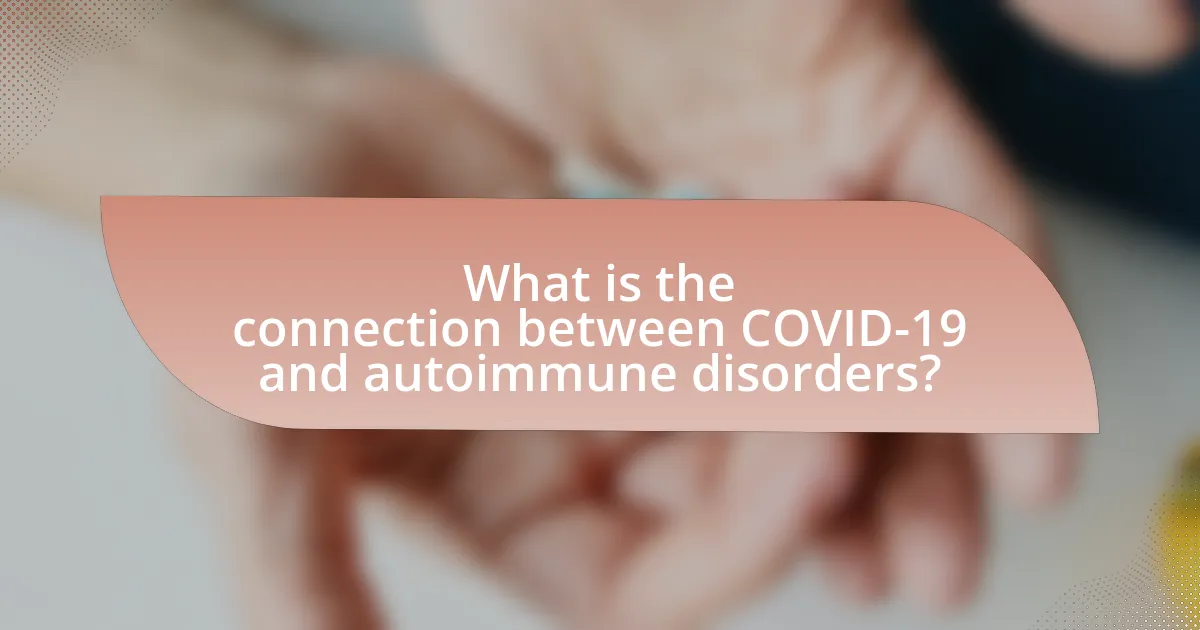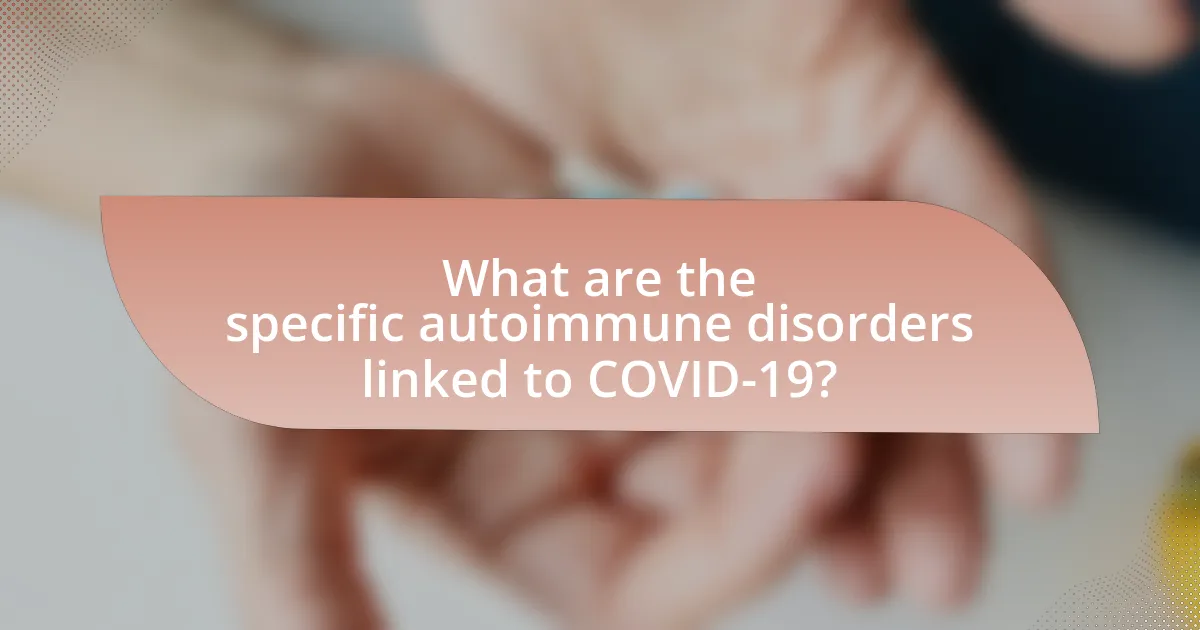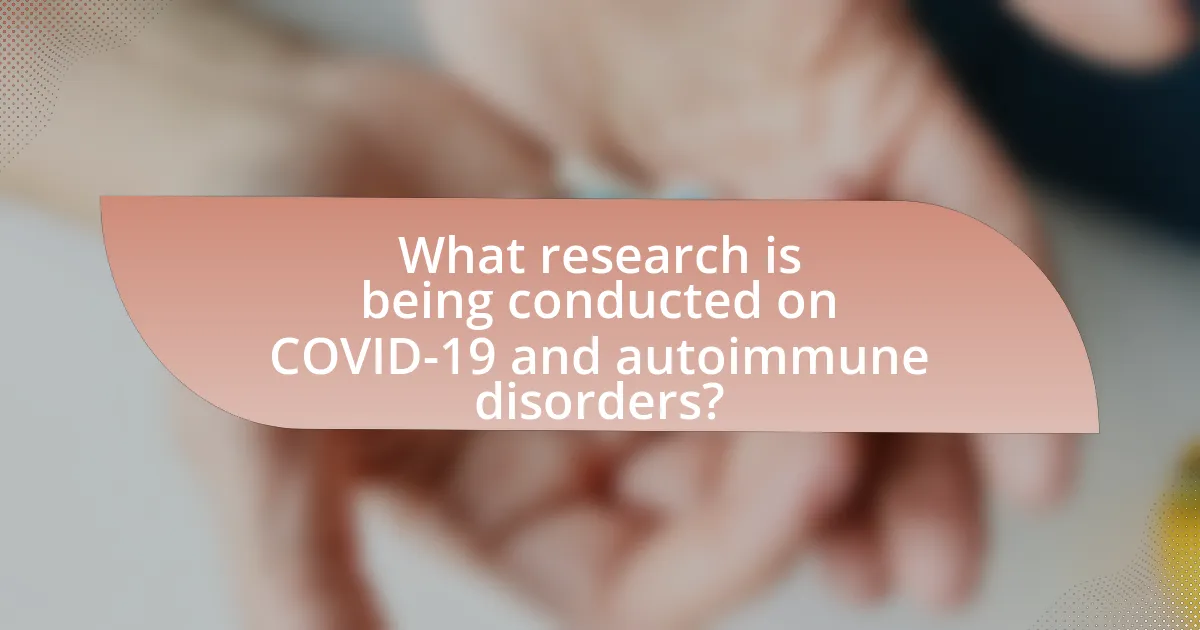The article examines the connection between COVID-19 and autoimmune disorders, highlighting how the virus can trigger or exacerbate autoimmune responses in some individuals. It discusses the mechanisms involved, such as cytokine storms and molecular mimicry, which can lead to the immune system mistakenly attacking the body’s own tissues. The article also outlines common autoimmune disorders linked to COVID-19, including Guillain-Barré syndrome and systemic lupus erythematosus, and emphasizes the importance of understanding this connection for improving treatment strategies and patient outcomes. Additionally, it reviews current research methodologies and findings that support the link between COVID-19 and autoimmune conditions, while suggesting practical steps for individuals to manage their health during the pandemic.

What is the connection between COVID-19 and autoimmune disorders?
COVID-19 has been associated with the onset or exacerbation of autoimmune disorders in some individuals. Research indicates that the virus can trigger an abnormal immune response, leading to autoimmune phenomena, where the immune system mistakenly attacks the body’s own tissues. A study published in the journal “Nature Reviews Immunology” highlights that COVID-19 can induce cytokine storms, which may contribute to autoimmune reactions. Additionally, the presence of viral antigens can mimic self-antigens, potentially leading to cross-reactivity and the development of autoimmune conditions.
How does COVID-19 impact the immune system?
COVID-19 significantly impacts the immune system by inducing a hyper-inflammatory response known as a cytokine storm, which can lead to severe tissue damage and complications. This overreaction occurs when the virus triggers the immune system to release an excessive amount of cytokines, leading to widespread inflammation and potentially resulting in acute respiratory distress syndrome (ARDS) and multi-organ failure. Studies have shown that patients with severe COVID-19 exhibit elevated levels of pro-inflammatory cytokines, such as interleukin-6 (IL-6) and tumor necrosis factor-alpha (TNF-α), which correlate with disease severity and poor outcomes. Additionally, COVID-19 can disrupt the balance of immune cells, leading to lymphopenia, a reduction in lymphocytes that are crucial for adaptive immunity, further compromising the body’s ability to fight infections and potentially increasing susceptibility to autoimmune disorders.
What are the immune responses triggered by COVID-19?
COVID-19 triggers several immune responses, primarily involving the activation of innate and adaptive immunity. The innate immune response includes the release of pro-inflammatory cytokines, such as interleukin-6 and tumor necrosis factor-alpha, which help to recruit immune cells to the site of infection. This response can lead to a cytokine storm in severe cases, causing tissue damage. The adaptive immune response involves the activation of T cells and B cells, leading to the production of antibodies specific to the SARS-CoV-2 virus. Studies have shown that neutralizing antibodies can persist for months after infection, indicating a memory response that may provide some level of protection against reinfection.
How can COVID-19 lead to autoimmune reactions?
COVID-19 can lead to autoimmune reactions by triggering an inappropriate immune response that mistakenly targets the body’s own tissues. The virus can induce molecular mimicry, where viral proteins resemble host proteins, leading to cross-reactivity and subsequent autoimmune responses. Studies have shown that patients recovering from COVID-19 exhibit elevated levels of autoantibodies, indicating a potential for autoimmune disorders. For instance, research published in the journal “Nature” by Long et al. (2020) found that a significant percentage of COVID-19 patients developed autoantibodies against various self-antigens, suggesting a link between the viral infection and the onset of autoimmune conditions.
What are autoimmune disorders?
Autoimmune disorders are conditions in which the immune system mistakenly attacks the body’s own tissues, leading to inflammation and damage. This occurs because the immune system fails to distinguish between foreign invaders, like viruses and bacteria, and the body’s own cells. According to the National Institutes of Health, there are over 80 different types of autoimmune disorders, including rheumatoid arthritis, lupus, and multiple sclerosis, affecting millions of people worldwide. These disorders can result in a wide range of symptoms, depending on the specific condition and the organs involved.
What are the common types of autoimmune disorders?
Common types of autoimmune disorders include rheumatoid arthritis, lupus, multiple sclerosis, type 1 diabetes, and Hashimoto’s thyroiditis. These disorders occur when the immune system mistakenly attacks the body’s own tissues. For instance, rheumatoid arthritis primarily affects the joints, while lupus can impact multiple organ systems. Multiple sclerosis involves the immune system attacking the protective covering of nerves, leading to neurological symptoms. Type 1 diabetes results from the immune system destroying insulin-producing cells in the pancreas, and Hashimoto’s thyroiditis leads to hypothyroidism due to the immune attack on the thyroid gland. Each of these disorders demonstrates the diverse ways in which autoimmune responses can manifest in the body.
How do autoimmune disorders affect the body?
Autoimmune disorders affect the body by causing the immune system to mistakenly attack healthy cells, leading to inflammation and damage in various tissues and organs. This misdirected immune response can result in symptoms such as fatigue, pain, and dysfunction in affected areas. For instance, in rheumatoid arthritis, the immune system targets joint tissues, causing pain and swelling, while in type 1 diabetes, it attacks insulin-producing cells in the pancreas, leading to high blood sugar levels. Research indicates that autoimmune disorders can also increase susceptibility to infections and other diseases, as the immune system is compromised by its own attacks on the body.
Why is understanding this connection important?
Understanding the connection between COVID-19 and autoimmune disorders is important because it informs treatment strategies and public health responses. Research indicates that COVID-19 can trigger or exacerbate autoimmune conditions, leading to increased morbidity in affected individuals. For instance, a study published in the Journal of Autoimmunity found that patients with pre-existing autoimmune diseases faced higher risks of severe outcomes from COVID-19, highlighting the need for tailored healthcare approaches. This understanding aids in developing preventive measures and therapeutic interventions, ultimately improving patient outcomes and resource allocation in healthcare systems.
What implications does this connection have for treatment?
The connection between COVID-19 and autoimmune disorders implies that treatment strategies must be adapted to address the heightened risk of autoimmune responses in COVID-19 patients. Research indicates that COVID-19 can trigger or exacerbate autoimmune conditions due to the virus’s impact on the immune system, leading to increased inflammation and autoantibody production. For instance, a study published in the Journal of Autoimmunity found that patients with severe COVID-19 exhibited elevated levels of autoantibodies, suggesting a link between viral infection and autoimmune activation. Consequently, treatment protocols may need to incorporate immunomodulatory therapies to mitigate these risks and manage symptoms effectively.
How can this understanding improve patient outcomes?
Understanding the connection between COVID-19 and autoimmune disorders can improve patient outcomes by enabling targeted treatment strategies. This understanding allows healthcare providers to identify patients at higher risk for autoimmune complications following COVID-19 infection, facilitating early intervention and personalized care plans. For instance, research published in the Journal of Autoimmunity indicates that COVID-19 can trigger autoimmune responses in susceptible individuals, leading to conditions such as Guillain-Barré syndrome. By recognizing these risks, clinicians can monitor and manage symptoms more effectively, ultimately reducing morbidity and enhancing recovery rates for affected patients.

What are the specific autoimmune disorders linked to COVID-19?
Specific autoimmune disorders linked to COVID-19 include Guillain-Barré syndrome, autoimmune thyroid disease, and systemic lupus erythematosus. Research indicates that COVID-19 can trigger these conditions due to immune dysregulation. For instance, a study published in the Journal of Autoimmunity found that patients with COVID-19 exhibited increased levels of autoantibodies, which are associated with autoimmune diseases. Additionally, cases of Guillain-Barré syndrome have been reported following COVID-19 infection, suggesting a direct link between the virus and the onset of this neurological disorder.
Which autoimmune disorders have been reported in COVID-19 patients?
Autoimmune disorders reported in COVID-19 patients include Guillain-Barré syndrome, autoimmune hemolytic anemia, and systemic lupus erythematosus. Research indicates that the inflammatory response triggered by COVID-19 can lead to the activation of autoimmune processes. For instance, a study published in the Journal of Autoimmunity highlighted cases of Guillain-Barré syndrome following COVID-19 infection, suggesting a potential link between the virus and the onset of this neurological disorder.
What evidence supports the link between COVID-19 and these disorders?
Research indicates a significant link between COVID-19 and autoimmune disorders, supported by various studies. For instance, a study published in the journal “Nature” by Long et al. (2021) found that COVID-19 can trigger autoimmune responses, leading to conditions such as Guillain-Barré syndrome and autoimmune thyroid disease. Additionally, a systematic review in “Frontiers in Immunology” by Dyer et al. (2022) highlighted that post-viral syndromes, including autoimmune manifestations, were observed in a subset of COVID-19 patients. These findings suggest that the immune dysregulation caused by the SARS-CoV-2 virus may contribute to the development or exacerbation of autoimmune disorders.
How do symptoms of these disorders manifest post-COVID-19?
Symptoms of autoimmune disorders post-COVID-19 can manifest as fatigue, joint pain, and neurological issues. Research indicates that individuals recovering from COVID-19 may experience exacerbated symptoms of pre-existing autoimmune conditions or develop new autoimmune responses. A study published in the journal “Nature” by Long COVID researchers found that approximately 10-30% of COVID-19 survivors reported persistent symptoms, including autoimmune-like manifestations, suggesting a potential link between the virus and the activation of autoimmune processes.
How does COVID-19 exacerbate existing autoimmune conditions?
COVID-19 exacerbates existing autoimmune conditions by triggering heightened immune responses and inflammation. The virus can lead to a cytokine storm, which is an overreaction of the immune system that can worsen autoimmune symptoms. Studies have shown that individuals with autoimmune diseases, such as lupus and rheumatoid arthritis, experience increased disease activity and flare-ups during COVID-19 infections. For instance, research published in the journal “Lupus” indicates that patients with systemic lupus erythematosus reported more severe symptoms and complications when infected with COVID-19, highlighting the direct impact of the virus on autoimmune disease management.
What mechanisms are involved in this exacerbation?
The mechanisms involved in the exacerbation of autoimmune disorders in the context of COVID-19 include immune dysregulation, molecular mimicry, and cytokine storm. Immune dysregulation occurs when the immune system becomes overactive or misdirected, leading to increased inflammation and tissue damage. Molecular mimicry refers to the phenomenon where viral antigens resemble self-antigens, prompting the immune system to attack the body’s own tissues. The cytokine storm is characterized by an excessive release of pro-inflammatory cytokines, which can exacerbate autoimmune responses and lead to severe complications. These mechanisms have been observed in studies linking COVID-19 to heightened autoimmune activity, demonstrating the complex interplay between viral infection and immune system dysfunction.
How can patients manage their autoimmune conditions during COVID-19?
Patients can manage their autoimmune conditions during COVID-19 by adhering to their prescribed treatment plans, maintaining regular communication with healthcare providers, and implementing preventive health measures. Following treatment plans is crucial, as consistent medication can help control symptoms and reduce flare-ups. Regular communication with healthcare providers allows for timely adjustments to treatment in response to any changes in health status or COVID-19 developments. Preventive health measures, such as practicing good hygiene, wearing masks, and social distancing, are essential to minimize the risk of infection, which can exacerbate autoimmune conditions. Studies indicate that individuals with autoimmune disorders may face higher risks of severe illness from COVID-19, underscoring the importance of these management strategies.

What research is being conducted on COVID-19 and autoimmune disorders?
Research is being conducted on the relationship between COVID-19 and autoimmune disorders, focusing on how the virus may trigger or exacerbate autoimmune conditions. Studies, such as those published in the journal “Nature Reviews Immunology,” indicate that COVID-19 can lead to the production of autoantibodies, which are associated with various autoimmune diseases. Additionally, research from the University of California, San Francisco, has shown that patients with pre-existing autoimmune disorders may experience more severe COVID-19 symptoms, highlighting the need for targeted treatment strategies. These findings underscore the importance of ongoing investigations into the immunological effects of COVID-19 on individuals with autoimmune conditions.
What are the current studies exploring this connection?
Current studies exploring the connection between COVID-19 and autoimmune disorders include research conducted by the University of California, San Francisco, which investigates the prevalence of autoimmune symptoms in COVID-19 survivors. This study, led by Dr. Rachael E. Clark, found that approximately 30% of patients reported new autoimmune symptoms post-infection. Additionally, a study published in the journal Nature Reviews Immunology by authors including Dr. Akiko Iwasaki examines the mechanisms by which SARS-CoV-2 may trigger autoimmune responses, highlighting the role of molecular mimicry and dysregulated immune responses. These studies provide evidence of a significant link between COVID-19 and the onset or exacerbation of autoimmune disorders.
What methodologies are being used in these studies?
The methodologies used in studies examining the connection between COVID-19 and autoimmune disorders primarily include observational studies, cohort studies, and case-control studies. Observational studies allow researchers to analyze the prevalence of autoimmune disorders in COVID-19 patients, while cohort studies track outcomes over time in groups exposed to the virus compared to unexposed groups. Case-control studies compare individuals with autoimmune disorders who have had COVID-19 to those without the disorder, identifying potential associations. These methodologies are validated by findings published in peer-reviewed journals, such as “Autoimmunity Reviews,” which detail the increased incidence of autoimmune conditions following COVID-19 infection.
What preliminary findings have emerged from recent research?
Recent research indicates a significant correlation between COVID-19 and the onset of autoimmune disorders. Studies have shown that individuals recovering from COVID-19 exhibit increased levels of autoantibodies, which are indicative of autoimmune activity. For instance, a study published in the journal “Nature” by researchers from the University of California found that 30% of patients who had recovered from COVID-19 developed new autoimmune markers. This suggests that the viral infection may trigger or exacerbate underlying autoimmune conditions, highlighting the need for further investigation into the long-term health implications for COVID-19 survivors.
How can future research improve our understanding of this connection?
Future research can improve our understanding of the connection between COVID-19 and autoimmune disorders by conducting longitudinal studies that track patients over time to observe the onset of autoimmune symptoms post-infection. These studies can provide insights into the mechanisms by which SARS-CoV-2 may trigger autoimmune responses, as evidenced by findings that some COVID-19 patients develop autoantibodies. Additionally, research focusing on genetic predispositions and immune system responses can clarify why certain individuals are more susceptible to autoimmune disorders after COVID-19. For instance, a study published in the journal “Nature” by Long et al. (2021) identified specific immune markers associated with post-viral autoimmune conditions, highlighting the need for targeted investigations in this area.
What areas require further investigation?
Areas that require further investigation include the long-term effects of COVID-19 on autoimmune disorder prevalence and the mechanisms by which SARS-CoV-2 may trigger autoimmune responses. Research indicates that COVID-19 can exacerbate existing autoimmune conditions and potentially lead to new autoimmune disorders, as seen in studies highlighting increased incidence rates post-infection. Additionally, understanding the role of genetic predisposition and environmental factors in this connection is crucial, as evidenced by findings that suggest a correlation between viral infections and autoimmune disease onset.
How can research findings influence clinical practices?
Research findings can significantly influence clinical practices by providing evidence-based guidelines that inform treatment protocols and patient management strategies. For instance, studies demonstrating the link between COVID-19 and autoimmune disorders have led to the adoption of specific screening and treatment approaches for affected patients. Research published in the journal “Nature Reviews Immunology” highlights that COVID-19 can trigger autoimmune responses, prompting clinicians to monitor patients for symptoms of autoimmune conditions post-infection. This evidence has resulted in updated clinical guidelines that emphasize the importance of early detection and intervention for autoimmune disorders in patients with a history of COVID-19.
What practical steps can individuals take to manage their health regarding COVID-19 and autoimmune disorders?
Individuals can manage their health regarding COVID-19 and autoimmune disorders by adhering to vaccination guidelines, maintaining a healthy lifestyle, and closely monitoring their health conditions. Vaccination against COVID-19 is crucial, as studies indicate that individuals with autoimmune disorders may have an increased risk of severe illness from the virus. A balanced diet, regular exercise, and adequate sleep can strengthen the immune system, which is particularly important for those with autoimmune conditions. Additionally, individuals should regularly consult healthcare providers to adjust treatment plans as necessary and to stay informed about any new research or recommendations related to COVID-19 and autoimmune disorders.
What preventive measures should individuals with autoimmune disorders consider during the pandemic?
Individuals with autoimmune disorders should prioritize vaccination, maintain social distancing, and practice rigorous hygiene during the pandemic. Vaccination is crucial as it significantly reduces the risk of severe illness from COVID-19, which is particularly important for those with compromised immune systems. Social distancing helps minimize exposure to the virus, while frequent handwashing and the use of hand sanitizers can prevent infection. According to the Centers for Disease Control and Prevention (CDC), individuals with autoimmune conditions are at higher risk for severe outcomes from COVID-19, reinforcing the need for these preventive measures.
How can patients effectively communicate with healthcare providers about their concerns?
Patients can effectively communicate with healthcare providers about their concerns by being clear, concise, and prepared during their interactions. This involves listing specific symptoms, questions, and concerns prior to appointments, which allows for focused discussions. Research indicates that patients who prepare for consultations by writing down their issues are more likely to convey their concerns effectively, leading to better healthcare outcomes. Additionally, using straightforward language and avoiding medical jargon helps ensure that both parties understand each other, fostering a more productive dialogue.


